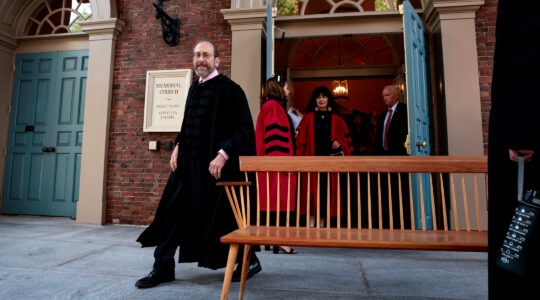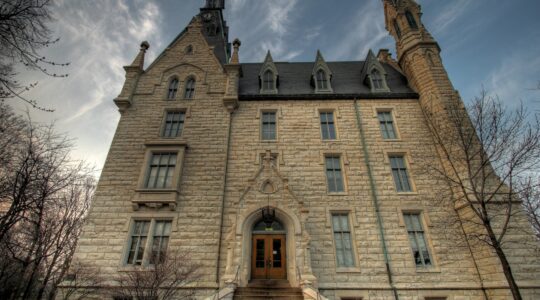WASHINGTON (JTA) – In Jewish Washington, it was the fraught and thorny question that inevitably came up in discussions about Tom Lantos: What about the Mormon thing?
The late chairman of the U.S. House of Representatives Foreign Affairs Committee, who died Feb. 11 of esophageal cancer at the age of 80, was the only Holocaust survivor ever elected to Congress. And he was fiercely pro-Israel, using his powerful position to advance the pro-Israel lobby’s agenda.
Yet his wife, Annette, also a survivor, and daughters Katrina and Annette were Mormons. What role did this play in Lantos’ own beliefs? Did it affect his Judaism?
The respective answers came at his memorial service last week: Apparently not much, and not at all.
“Tom didn’t believe in God in the way that most of us do,” his widow said at the service Feb. 14 in the Statuary Hall in the U.S. Capitol building, where his family – including 18 grandchildren and two great-grandchildren – were present.
His friend, Rabbi Arthur Schneier of New York, recalled singing Hebrew psalms with Lantos days before he died. He also remembered visiting with Lantos several years ago at the Budapest synagogue where Lantos had his bar mitzvah.
“I presided over that wonderful, memorable celebration and we sang ‘Siman tov umazal tov’,” a Jewish song of joy, Schneier said of that synagogue visit.
His daughter, Annette, said in her eulogy that her father was a man of “profound faith” and listed his beliefs: in the U.S. Constitution, in education, in friendship, in the responsibility to change the world for the better, even in the power of dogs to heal – but notably, belief in a deity was lacking.
Instead, the younger Annette suggested, he admired his wife’s beliefs but did not embrace them: “He had faith in the sustaining power of her faith in spirituality,” she said.
The hall, packed with most of the lawmakers who make up the informal congressional Jewish caucus and their staffs, was rapt.
Lantos, first elected to Congress in 1980 as a Democratic lawmaker from California, was remembered as a champion of human rights, from his work on the 1980s on behalf of Soviet Jewry, to recent times, defending the rights of civilians in Darfur and free speech advocates in China and promoting access to HIV/AIDS treatment in Africa.
Speakers included Ban Ki-moon, the U.N. secretary-general; Elie Wiesel, the Holocaust memorialist and Nobel laureate; and Bono, the rock star and Africa advocate who led the mourning in singing “All You Need is Love” as a Valentine’s Day paean to the Lantos marriage.
The question of Lantos’ faith had long presented a dilemma: Questions of taste and fears of Lantos’ notorious wrath kept it from being asked aloud while he lived.
Yet he was a politician who wore his Jewish experience on his sleeve. At least three links on his congressional Web site detailed his biography as the youthful fighter in the Hungarian resistance who discovered after the war that the Nazis had killed most of his family.
Those experiences permeated the memorial, which began and ended with blessings from Schneier, Lantos’ longtime friend and fellow survivor, who founded the Appeal of Conscience Foundation, which promotes religious freedoms.
“You remember that, Annette – being a step ahead of our persecutors?” Schneier asked Lantos’ widow. “Forgetting about our music lessons, forgetting about our ballgames,” he continued. “What a journey it has been from the valley of dry bones to the heights of human achievement.”
A number of Jews in public life are intermarried, but Lantos’ wife had not merely converted, she had embraced a faith – the Church of Latter Day Saints – that until the 1970s had preached the inferiority of blacks and until the 1990s had conducted posthumous baptisms of Jews, including Holocaust victims. Moreover, it is a culture that encourages conversion and does not easily accommodate intermarriage
Annette Lantos noted during the memorial ceremony that differences of faith with her husband informed even his final days, in the finality of death Lantos embraced and the eternal life that her church preaches.
She noted that Lantos likened his life to a vacation at his beloved Lake Balaton in Hungary.
“But like all vacations,” she said, using his words, “there must be an end to it. We have to move on.”
“And so he did. I do not believe in death. I do believe in different forms of life. And therefore I feel with great certainty that Tom is alive, and that he’s here right now listening to our farewell before he will depart into the light for a joyous reunion with his friends and deceased family.”
The entire memorial service was a gentle back and forth of Jewish and Mormon perspectives on remembering Lantos, who was cremated.
His daughter Katrina closed her remarks with a reading on eternal life from the final pages of the Chronicles of Narnia, the Christian allegory by C.S. Lewis.
Schneier said that in Lantos’ final days, he and his wife joined Annette and Lantos in their Washington apartment, “reciting the psalms together, and singing the Sh’ma Israel,” the Jewish invocation of God’s oneness that gains special meaning when it is said close to death.
Like Lantos’ widow, Schneier also quoted the late congressman as invoking the finality of death: “He has a message for all of us,” he said. “What’s the message? We all go through that one-way street that leads to the grave, there is no immunity from the grave, we all have to meet our maker sooner or later. And the message of Tom: Maximize your stay on earth, and be a blessing.”
Tzipi Livni, Israel’s foreign minister, also delivered a eulogy. She recalled Lantos’s last visit to Israel last year, where they toured military installations along the northern border and heard pleas from military commanders to keep Israel safe. Afterward, they saw a film about the American failure to bomb Auschwitz.
“Those same skies that did not hear the roar of the fighter’s planes in time were hearing them now,” she said. “And in my eyes, the Star of David that was just formed from a yellow Star of David on the torn clothing of a victim into a shining blue Star of David emblazoned on an American Air Force jet and flown by an Israeli fighter pilot, that shining star is Tom Lantos.”
She finished with the Hebrew blessing, “May his memory be blessed.”
JTA has documented Jewish history in real-time for over a century. Keep our journalism strong by joining us in supporting independent, award-winning reporting.





